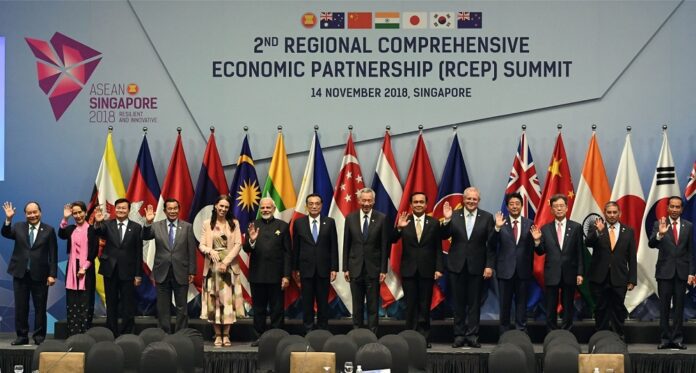Leaders and representatives pose for a group photo during the 2nd Regional Comprehensive Economic Partnership summit on the sidelines of the 33rd Asean Summit in Singapore November 14, 2018. — AFP pic
KUALA LUMPUR, March 18 — The Regional Comprehensive Economic Partnership (RCEP) agreement comes into force for Malaysia today, paving the way for the country to integrate into the world’s largest free trade agreement (FTA) that involves 15 countries, with a total population of more than 2.2 billion.
The RCEP represents a significant milestone in the vibrant growth and revitalisation of economies, said the International Trade and Industry Ministry (Miti).
Anchored on the rules-based multilateral trading system, it will enable Malaysia to enjoy the global trade and investment ecosystem, benefiting from the eventual elimination of around 90 per cent of tariff among members.
“Other advantages to be gained include the further liberalisation of trade, encompassing removal of non-tariff barriers, increased trade facilitation, removal of barriers to services sector, as well as enhancement of business environment through regulations relating to intellectual property protection, government procurement practices and e-commerce,” the ministry said in a statement today.
According to Miti, the establishment of the RCEP positions the Asia-Pacific region as the new centre of gravity for global commerce, boosting intraregional trade by nearly US$42 billion (US$1= RM4.19).
“Among the Asean countries, Malaysia is expected to be the largest beneficiary of the agreement in terms of gains in exports, with a projected US$200 million increase,” it said.
It said the RCEP, which complements the World Trade Organisation’s development agenda, will enhance recognition of the role of the small and medium-sized enterprises, including micro-enterprises in contributing to economic growth, employment and innovation.
“Noteworthy too is the provision of the special and differential treatment accorded to least-developed members, which would be instrumental in advancing equitable economic development,” the ministry said.
Miti said as the world gradually recovers from the economic repercussions of the pandemic, the RCEP presents a vital tool to re-invigorate businesses and economic activities through a marked reduction in barriers to trade across the region.
Apart from strengthening existing networks, it said the RCEP would spark the creation of new regional supply chains, thereby boosting the growth of domestic businesses as they enter into the global trading ecosystem.
“Business communities, from large to small scale entrepreneurs, are encouraged to take advantage of the vast investment opportunities and greater participation in regional and global value chains presented by this mega-trade agreement,” it said.
Deemed as the largest FTA in the world, the RCEP was signed among 15 countries on Nov 15, 2020, after going through 31 rounds of negotiations over the past eight years.
The countries are Malaysia, Brunei, Singapore, Vietnam, Cambodia, Indonesia, Laos, Myanmar, the Philippines, Thailand, China, South Korea, Australia, Japan and New Zealand.
Altogether, the countries account for nearly a third of the global population and world gross domestic product. — Bernama


